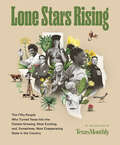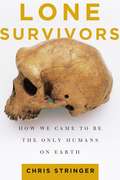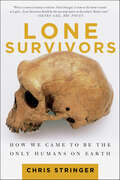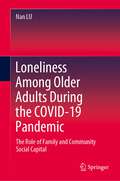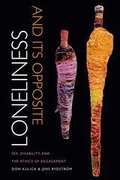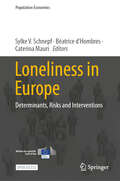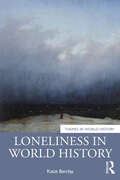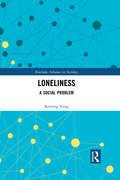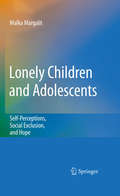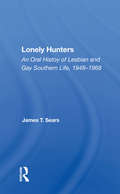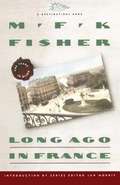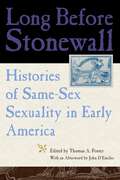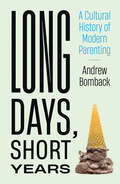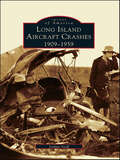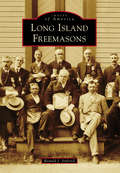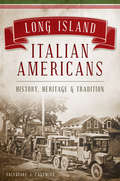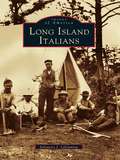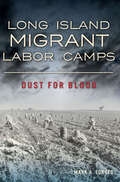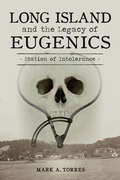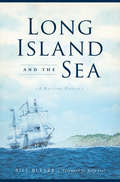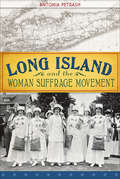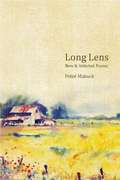- Table View
- List View
Lone Star: A History of Texas and the Texans
by T. R. FehrenbachThe definitive account of the incomparable Lone Star state by the author of Fire & Blood: A History of Mexico. T. R. Fehrenbach is a native Texan, military historian and the author of several important books about the region, but none as significant as this work, arguably the best single volume about Texas ever published. His account of America's most turbulent state offers a view that only an insider could capture. From the native tribes who lived there to the Spanish and French soldiers who wrested the territory for themselves, then to the dramatic ascension of the republic of Texas and the saga of the Civil War years. Fehrenbach describes the changes that disturbed the state as it forged its unique character. Most compelling is the one quality that would remain forever unchanged through centuries of upheaval: the courage of the men and women who struggled to realize their dreams in The Lone Star State.
Lone Stars Rising: The Fifty People Who Turned Texas Into the Fastest-Growing, Most Exciting, and, Sometimes, Most Exasperating State in the Country
by Editors of Texas MonthlyIn celebration of the fiftieth anniversary of Texas Monthly, a collection of original essays and portraits of fifty groundbreaking Texans who have shaped the Lone Star State—and the nation—over the past half century. With a population of twenty-nine million, Texas has birthed some of America’s most innovative, culture-altering politicians, entertainers, athletes, and activists of the last five decades. In Lone Stars Rising, the editors of Texas Monthly select fifty of the most trailblazing Texans who have shaped the Lone Star State and America today.Organized by decade and featuring essays from the magazine’s legendary roster of contributors, accompanied by drawings and fifty photographs throughout, this collection includes incisive commentary on the stars whose rise from Texas to the world stage has been meteoric, as well as the lesser-known individuals who have been toiling on the sidelines, quietly and intentionally shaping the way we think and talk about the Texas that exists today.Coinciding with the fiftieth anniversary of Texas Monthly, Lone Stars Rising is the quintessential ode to the Lone Star State in all its complexity.
Lone Survivor
by Ken HodgsonKen Hodgson, an authentic, powerfully original voice in Western fiction, returns with the most notorious story in the annals of the frontier ... In 1873, Alferd Packer led 21 men from Utah to the gold fields of Colorado. Three months later, he came back to civilization alone, guarding the terrible secret of what he had done there. To this day, no one knows what really happened on that fateful expedition ... except Packer himself. LONE SURVIVOR brilliantly recreates - from Packer's unique point of view - a tale of unforgiving terrain, of savage winter storms and dwindling food supplies, and of a desperate journey into the wilderness, where brave men died and he crossed a line few dare to cross ... Historical fiction.
Lone Survivors: How We Came to Be the Only Humans on Earth
by Chris StringerIn this groundbreaking and engaging work, world-renowned paleoanthropologist Stringer sets out a new theory of humanity's origin, offering the definitive account of who and what we were, and a work that will change perceptions about our origins and about what it means to be human.
Lone Survivors: How We Came to Be the Only Humans on Earth
by Chris StringerA top researcher proposes a controversial new theory of human evolution in a book “combining the thrill of a novel with a remarkable depth of perspective” (Nature).In this groundbreaking and engaging work of science, world-renowned paleoanthropologist Chris Stringer sets out a new theory of humanity’s origin, challenging both the multiregionalists (who hold that modern humans developed from ancient ancestors in different parts of the world) and his own “out of Africa” theory, which maintains that humans emerged rapidly in one small part of Africa and then spread to replace all other humans within and outside the continent. Stringer’s new theory, based on archeological and genetic evidence, holds that distinct humans coexisted and competed across the African continent—exchanging genes, tools, and behavioral strategies.Stringer draws on analyses of old and new fossils from around the world, DNA studies of Neanderthals (using the full genome map) and other species, and recent archeological digs to unveil his new theory. He shows how the most sensational recent fossil findings fit with his model, and he questions previous concepts (including his own) of modernity and how it evolved.With photographs included, Lone Survivors will be the definitive account of who and what we were—and will change perceptions about our origins and about what it means to be human.“An essential book for anyone interested in psychology, sociology, anthropology, human evolution, or the scientific process.” —Library Journal“Highlights just how many tantalizing discoveries and analytical advances have enriched the field in recent years.” —Literary Review
Lone Wolves: The New Terrorism of Right-Wing Single Actors
by Florian HartlebAs the attacks in Norway, Munich and most recently Christchurch have shown: a new threat is now shaking liberal Western societies. Radicalized right-wing extremists – so-called lone wolves – are engaging in individually planned terror attacks. Written by an expert on terrorism and populism, this book highlights the dynamics of this new breed of terrorism. By providing in-depth insights into the biographies of individual perpetrators, it illustrates the changing profile of the typical lone terrorist. This new kind of terrorist engages in violence without being a member of a party or organization, yet is radicalized by a global right-wing subculture that communicates in virtual networks. This startling and well-written book reveals the ideological roots of lone wolf terrorism and urges governments and civil society to take the threat seriously and implement suitable countermeasures.
Loneliness Among Older Adults During the COVID-19 Pandemic: The Role of Family and Community Social Capital
by Nan LUThis book investigates the relationship between social capital and loneliness of older adults living in urban China during the COVID-19 outbreak period. It also tested the mediation role of community-based cognitive social capital on the relationship between community-based structural social capital and loneliness of older urban Chinese adults.This book targets at a broad audience with knowledge in social gerontology and social work with older adults. It will appeal to academic researchers, undergraduate and graduate students, policymakers, and social workers who have interests in social capital and mental well-being in later life, and the impacts of COVID-19 on the well-being of older adults.
Loneliness and Its Opposite: Sex, Disability, and the Ethics of Engagement
by Don Kulick Jens RydströmFew people these days would oppose making the public realm of space, social services and jobs accessible to women and men with disabilities. But what about access to the private realm of desire and sexuality? How can one also facilitate access to that, in ways that respect the integrity of disabled adults, and also of those people who work with and care for them?Loneliness and Its Opposite documents how two countries generally imagined to be progressive engage with these questions in very different ways. Denmark and Sweden are both liberal welfare states, but they diverge dramatically when it comes to sexuality and disability. In Denmark, the erotic lives of people with disabilities are acknowledged and facilitated. In Sweden, they are denied and blocked. Why do these differences exist, and how do both facilitation and hindrance play out in practice?Loneliness and Its Opposite charts complex boundaries between private and public, love and sex, work and intimacy, and affection and abuse. It shows how providing disabled adults with access to sexual lives is not just crucial for a life with dignity. It is an issue of fundamental social justice with far reaching consequences for everyone.
Loneliness in Europe: Determinants, Risks and Interventions (Population Economics)
by Sylke V. Schnepf Béatrice D’Hombres Caterina MauriThis open-access volume accompanies the microdata release of the EU Loneliness Survey. Loneliness, often referred to as the ‘epidemic of the 21st century’, has emerged as a grave public health concern. For years, a lack of comprehensive European cross-national data hindered a thorough examination of this issue. In 2022, the European Commission's Joint Research Centre conducted the inaugural EU Loneliness Survey, covering around 30,000 individuals in 27 European nations. The book sheds light on who is most affected by loneliness, identifies contributing experiences and behaviours, addresses the stigmatisation of loneliness and discusses its societal impact. Furthermore, it emphasises the importance of interventions to combat loneliness. Finally, the book discusses the challenges of survey design and offers valuable insights for the monitoring of loneliness in Europe in the future. This makes the book a must-read for scholars and academics interested in population economics, public health and social well-being.
Loneliness in World History (Themes in World History)
by Katie BarclayThis book takes a thematic approach to questions of how to define emotion and loneliness, breaking down loneliness into a range of different dimensions – estrangement, longing, homesickness, isolation – and considers how these phenomena appear across a range of global contexts.Loneliness is a topic of current concern, a downside of the anomie of the modern condition. Yet, emotions and experiences that share some of the features of loneliness can be found in cultures from the ancient world onwards. The book engages with discussions about what loneliness might encompass and how different societies and people have experienced it, raising key questions including where we place the boundaries of emotion, what makes particular emotions distinctive and cultural (or conversely universal), and how we might engage in comparative work across languages and cultures.Loneliness in World History provides an introduction to an important contemporary emotion across cultures and time, and it is particularly suited for undergraduate students and those new to the field of the history of emotions.
Loneliness: A Social Problem (Routledge Advances in Sociology)
by Keming YangIn recent years its medical implications have brought loneliness to the centre of attention of mass media, government agents, and the general public. However, as this volume demonstrates, loneliness is not merely a psychological, individual, or health issue. In multiple ways, it is a serious social problem as well. Yang urges fellow researchers and scientists to broaden the existing definition and classification of loneliness, to measure loneliness with greater accuracy, and to establish more specifically the connection between loneliness and particular illness. Drawing on vast sources of data including literary works, case studies, and large-scale sample surveys covering a broad spectrum of countries (Europe and beyond), the empirical research of this study produces and presents simple but effective evidence for the social nature and variations of loneliness. Examining loneliness at higher levels, including ethnic groups, classes, national cultures, and societies, Loneliness will appeal to students and researchers interested in areas such as sociology, pyschology, and mental health.
Lonely Children and Adolescents
by Malka MargalitFrom texting and social networking sites to after-school activities, young people have many opportunities to interact with one another, and yet loneliness and isolation trouble today's youth in increasing numbers. Many children and teens report feeling lonely even in the midst of family and friends, and childhood loneliness is a prime risk factor for adult alienation. Lonely Children and Adolescents: Self-Perceptions, Social Exclusion, and Hope illuminates seldom-explored experiences of social isolation among young people as well as the frustrations of the parents and teachers who wish to help. This groundbreaking book conceptualizes loneliness not simply as the absence of social connections, but as a continuum of developmental experience, often growing out of the conflict between opposite needs: to be like one's peers yet be one's unique self. The author draws clear distinctions between loneliness and solitude and identifies genetic and environmental characteristics (i.e., social, psychological, familial, and educational) that can be reinforced to help children become more resilient and less isolated. In addition, therapeutic approaches are described that challenge loneliness by encouraging empowerment, resilience, and hope, from proven strategies to promising tech-based interventions. Highlights include: * Developmental perspectives on loneliness. * Schools and the role of teachers, from preschool to high school. * Peer relations (e.g., cliques, bullies, exclusion, and popularity). * Lonely children, lonely parents: models of coping. * Loneliness in the virtual world. * Prevention and intervention strategies at home, at school, in therapy. Asking its readers to rethink many of their assumptions about social competence and isolation, this volume is essential reading for researchers and professionals in clinical child, school, developmental, and educational psychology; allied education disciplines; social work; and social and personality psychology.
Lonely Hunters: An Oral History Of Lesbian And Gay Southern Life, 1948-1968
by James T SearsAs in his highly acclaimed Growing Up Gay in the South, James Sears masterfully blends a symphony of Southern voices to chronicle the era from the baby boom to the dawn of gay rights and the Stonewall riot. Sears weaves a rich historical tapestry through the use of personal reminiscences, private letters, subpoenaed testimony and previously
Long Ago in France: The Years In Dijon
by M. F. K. FisherFrom one of the most gifted writers of our time, a nostalgic account of France, replete with fascinating characters and memorable meals. In this very personal reminiscence, readers glimpse beautiful Dijon against the backdrop of between-the-wars Europe through the eyes, heart and stomach of a most wise and articulate woman.
Long Before Stonewall: Histories of Same-Sex Sexuality in Early America
by Thomas A. Foster2007 Choice Outstanding Academic TitleAlthough the 1969 Stonewall riots in New York City symbolically mark the start of the gay rights movement, individuals came together long before the modern era to express their same-sex romantic and sexual attraction toward one another, and in a myriad of ways. Some reflected on their desires in quiet solitude, while others endured verbal, physical, and legal harassment for publicly expressing homosexual interest through words or actions.Long Before Stonewall seeks to uncover the many iterations of same-sex desire in colonial America and the early Republic, as well as to expand the scope of how we define and recognize homosocial behavior. Thomas A. Foster has assembled a pathbreaking, interdisciplinary collection of original and classic essays that explore topics ranging from homoerotic imagery of black men to prison reform to the development of sexual orientations. This collection spans a regional and temporal breadth that stretches from the colonial Southwest to Quaker communities in New England. It also includes a challenge to commonly accepted understandings of the Native American berdache. Throughout, connections of race, class, status, and gender are emphasized, exposing the deep foundations on which modern sexual political movements and identities are built.
Long Days, Short Years: A Cultural History of Modern Parenting
by Andrew BombackHow parenting became a verb, from Dr. Spock and June Cleaver to baby whispering and free-range kids.When did &“parenting&” become a verb? Why is it so hard to parent, and so rife with the possibility of failure? Sitcom families of the past—the Cleavers, the Bradys, the Conners—didn&’t seem to lose any sleep about their parenting methods. Today, parents are likely to be up late, doomscrolling on parenting websites. In Long Days, Short Years, Andrew Bomback—physician, writer, and father of three young children—looks at why it can be so much fun to be a parent but, at the same time, so frustrating and difficult to parent. It&’s not a &“how to&” book (although Bomback has read plenty of these) but a &“how come&” book, investigating the emergence of an immersive, all-in approach to raising children that has made parenting a competitive (and often not very enjoyable) sport. Drawing on parenting books, mommy blogs, and historical accounts of parental duties as well as novels, films, podcasts, television shows, and his own experiences as a parent, Bomback charts the cultural history of parenting as a skill to be mastered, from the laid-back Dr. Spock&’s 1950s childcare bible—in some years outsold only by the actual Bible—to the more rigid training schedules of Babywise. Along the way, he considers the high costs of commercialized parenting (from the babymoon on), the pressure on mothers to have it all (and do it all), scripted parenting as laid out in How to Talk So Kids Will Listen, parenting during a pandemic, and much more.
Long Island Aircraft Crashes: 1909-1959
by Joshua StoffDuring the first fifty years of American aviation, Long Island was at the center of aircraft innovation and flight. There were more aircraft manufacturers and airports located on Long Island than in any other part of the United States. Due to the extraordinarily high volume of air traffic, Long Island also led the country-if not the world-in aircraft crashes. Long Island Aircraft Crashes: 1909-1959 portrays the daring flights, accidents, and mishaps of pioneer pilots, and the conditions that contributed to many crashes. Long Island ultimately saw the earliest air-traffic control systems, airport lighting, aviation weather reports, paved runways, and professional flight schools. Long Island Aircraft Crashes: 1909-1959 contains captivating images from Mitchel Field and Roosevelt Field, the two most active airfields on Long Island. In addition to airfield activity, this book illustrates some of the first experimental flights over Hempstead Plains; military training at Hazelhurst Field; the L.W.F. Owl bomber (the largest landplane of its time); the world's first instrument-guided flight; and Amelia Earhart posing with the new Sperry Gyropilot.
Long Island Freemasons (Images of America)
by Ron SeifriedThe first Masonic lodge in what is today Nassau and Suffolk Counties was constituted in 1793. For over 200 years, more than 70 lodges were founded and flourished in various locations from Amagansett to Great Neck. For the first time, some of the secrets of the Masonic fraternity are revealed in this book. Recovered from dusty lodge attics and closets, this selection of long-forgotten photographs and artifacts gives the readers a brief glimpse of what was taking place behind the closed doors of their local lodge. Long Island was the Masonic home of Theodore Roosevelt of Oyster Bay and, 30 years later, was honored by a visit to the Huntington Masonic lodge by his fifth cousin and fellow Mason Franklin D. Roosevelt. Masons continue to support the community through charitable endeavors, including the Masonic Medical Research Institute, Masonic Safety Identification Programs, Shriners Hospitals, and many more.
Long Island Italian Americans: History, Heritage and Tradition (American Heritage)
by Salvatore J. LaguminaFor Italian immigrants and their descendants, moving from "the city" out to Long Island was more than a change of address. It signaled that the family had achieved the American dream, and in turn, elements of Italian values and culture are visible all over the island. Italians helped to build Long Island, whether as laborers or as contractors, such as the Castagnas. They brought their culinary traditions and opened markets, such as the still family-owned Iavarone Brothers Foods and restaurants, including New Hyde Park's Umberto's. Italians' industrialism helped them thrive in fields as diverse as medicine, politics, acting and winemaking and importing (including the nationally recognized Banfi label). Join author Salvatore J. LaGumina to discover the remarkable contributions and vibrant culture of Italians and Italian-Americans on Long Island.
Long Island Italians (Images of America)
by Salvatore J. LaguminaIn America "the streets were paved with gold." That was the mistaken notion of many an immigrant to the United States in the late 1800s and early 1900s. On Long Island, deluded sojourners from Italy were to find that in fact there were few streets and that they themselves were to be the ones to build them.Covering more than a century of history, Long Island Italians depicts the transition of urban Italians as they moved increasingly from the city to the suburbs in Nassau and Suffolk Counties. They were attracted to Long Island by economic opportunity, the availability of arable land, home ownership possibilities, and alternatives to harsh city life. There, they became the largest of all ethnic groups, with more Americans of Italian descent living in one concentrated area than anywhere besides Italy. The Italian American presence is a continuing phenomenon, today comprising about 25 percent of the total population of Long Island. Long Island Italians graphically illustrates that Italian laborwas vital to the development of Long Island roads, agriculture, railroads, and industry. By the early twentieth century, Italians made up the bulk of the work force. The book goes beyond the laborers to show also the warmth of Italian family life, the strength of the social organizations, and the rise of the politicians.
Long Island Migrant Labor Camps: Dust for Blood
by Mark A TorresThe little-known history of the Suffolk County camps where migrant workers lived in squalor during and after WWII—includes photos. During World War II, a group of potato farmers opened the first migrant labor camp in Suffolk County to house farmworkers from Jamaica. Over the next twenty years, more than one hundred camps of various sizes would be built throughout the region. Thousands of migrant workers lured by promises of good wages and decent housing flocked to Eastern Long Island, where they were often cheated out of pay and housed in deadly slum-like conditions. Preyed on by corrupt camp operators and entrapped in a feudal system that left them mired in debt, laborers, whether Jamaican or Mexican, Polish or Chinese, struggled and, in some cases, perished in the shadow of New York&’s affluence. In this book Mark A. Torres reveals the dreadful history of Long Island&’s migrant labor camps from their inception to their peak in 1960—and their steady decline in the following decades. &“I urge folks to read this book.&” —Fire Island News
Long Island and the Legacy of Eugenics: Station of Intolerance
by Mark A. TorresA Dark History Revealed In the early twentieth century, eugenics was at the forefront of scientific discourse in the quest to understand human genetics. On Long Island and throughout the nation, eugenicists were granted unfettered access to conduct experiments on prisoners, psychiatric patients, Coney Island circus performers and more, all in an effort to legitimize a false science. The origins of the eugenics movement can be found within the Eugenics Record Office, an otherwise nondescript two-and-a-half-story administrative building at Cold Spring Harbor, New York, under the direction of Charles Benedict Davenport from 1910 to 1939. The work conducted there directly led to the forced sterilization of thousands of American citizens and the passage of anti-immigration laws and sparked a deadly global movement. Author Mark Torres explores the local characters, influences, landmarks and ghastly consequences that emanated from this small Long Island facility for decades and spread throughout the world.
Long Island and the Sea: A Maritime History
by Bill BleyerFor more than five centuries, the waterways surrounding Long Island have profoundly shaped its history. Familiar subjects of lighthouses, shipwrecks and whaling are found alongside oft-forgotten history such as Pan-American flying boats landing in Manhasset Bay in the early days of transatlantic flight. From the British blockade and skirmishes during the American Revolution to the sinking of merchant vessels by Germany in World War II, the sea brought wars to these shores. Gold Coast millionaires commuted in high-speed yachts to Manhattan offices as the island's wealth grew. Historian Bill Bleyer reveals Long Island's nautical bonds from the Native Americans to current efforts to preserve the region's maritime heritage.
Long Island and the Woman Suffrage Movement
by Antonia PetrashAn account of how the women’s rights movement found fertile ground on Long Island and succeeded thanks to the suffragettes’ classic grassroots campaign. For seventy-two years, American women fought for the right to vote, and many remarkable ladies on Long Island worked tirelessly during this important civil rights movement. The colorful—and exceedingly wealthy—Alva Vanderbilt Belmont was undoubtedly the island’s most outspoken and controversial advocate for woman suffrage. Ida Bunce Sammis, vigorous in her efforts, became one of the first women elected to the New York legislature. Well-known Harriot Stanton Blatch, daughter of Elizabeth Cady Stanton, worked with countless other famous and ordinary Long Islanders to make her mother’s quest a reality. Author Antonia Petrash tells the story of these and other women’s struggle to secure the right to vote for themselves, their daughters and future generations of Long Island women.
Long Lens
by Peter Makuck"Peter Makuck sees through the detritus of daily life to what matters. . . . It's that essence that lives deep down in things, looked for in people, sea- and landscapes, and creatures, that lifts the quotidian toward the marvelous, and animates this selection of poems from four decades."--Brendan GalvinFrom "Long Lens":Folding laundry, I can see our clotheslinewaving its patches of color like the flagof a foreign country where I had happily livedin a small clapboard house surrounded by pines.I can hear my mother in her strong accentsaying she didn't want a dryereven when we could finally afford one--Our sheets won't smell of trees and sunlight anymore.Long Lens represents forty years of Peter Makuck's work, including twenty-five new poems. With precise language, Makuck's imagery evokes spiritual longing, love, loss, violence, and transcendence. His subjects include the aftermath of the 1970 killings at Kent State University; scuba diving on an offshore shipwreck; flying through a storm in a small plane; rescuing a boy caught in a riptide; and lucid observations of spinner sharks, a gray fox, a spider, and a pelican tangled in a fishing line.Peter Makuck taught at East Carolina University from 1976 to 2006, where he founded Tar River Poetry. He was 2008 Lee Smith Chair in Creative Writing at North Carolina State University. Winner of the Brockman Award and the Charity Randall Citation, he lives on Bogue Banks, one of North Carolina's barrier islands.

